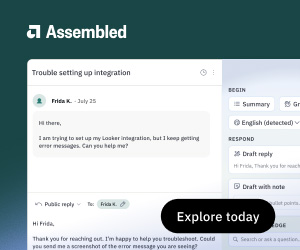Dick Bourke discusses the most important soft-skills to have in the contact centre, while asking: do agents with strong soft skills last longer?
Staff turnover is costly for any call centre. Several recent studies have shown that most call centres do not even calculate the real cost of their employees leaving, which should be composed of hiring costs, training, and lost productivity. Most call centres have a turnover rate of between 30 and 45 percent.
The problem is compounded by the fact that many call centre agents are young. Millennials stay on any job (not just those at call centres) for an average of 1.1 years.
Is there a way to predict which job candidates are more likely to stay on the job longer and which ones will walk away?
This series of articles is going to look at the role of soft skills in agent hiring and retention.
What Are Soft Skills?
Soft skills are employee characteristics that allow them to function and interact smoothly in the workplace.
Tip 1. Look for soft skills up front
Most of the time, recruiters look at “hard skills”, which involve mastery of certain competencies needed in the job, including computer skills, computational ability, and knowledge of specific software programs. While it is certainly nice to hire an employee who does not need significant training, human resources need to look beyond hard skills and evaluate how the potential employee will interact with their co-workers, communicate with clients, and be able to continue to learn on the job. The best way to get these employees into your business is to hire people who have demonstrated the ability in the past.
Tip 2. Add soft skills to your training goals
Once on the job, retaining employees requires managers to develop their reports’ soft skills. We tend to think about training in terms of improving technical skills, product knowledge or improving performance in selling situations. In addition to this hard skills trainings, you should also be implementing soft skill mastery. This can be done in both classroom situations and in informal training throughout the work week.
Both employee onboarding and professional development training should have soft skills components. However, soft skills training should be incorporated into the agents’ everyday routine as well. For instance, if you saw someone incorrectly entering data, you would take the time to correct the situation. But too often, managers do not want to hurt people’s feelings. So, opportunities to guide the development of soft skills get passed over.
Tip 3. Use real-world issues as opportunities
For instance, if an agent blames another employee for something, step in and address the issue right away. Professionalism is a core soft skill for customer service agents, so taking a few minutes to gently guide the worker toward an alternative approach in the moment when the unprofessional behaviour is happening will go a long way to creating a workforce that has sophisticated soft skills.
What Soft Skills Are Most Necessary in the Call Centre Environment?
It is not possible to identify the specific, measurable outcome that will make an agent great in the call centre environment, but there are some broad categories that you can explore to determine the specific traits you want to select for and develop.
Broadly speaking, the top five soft skills for customer service agents involve communication, professionalism, empathy, product knowledge, and problem solving.
1. Great and Effective Communication Skills
The call centre agent is first and foremost a communicator. They are literally interacting with customers all day. The reality is that communication is a process and that process can be measured. While there are many different communication channels including voice, text, email, and chat, all depend on effective communication
Measure: develop benchmarks for delivery, coming to a satisfactory resolution, and actual outcomes.
2. Professionalism in the Agent’s Attitude
Professionalism is defined as behaving in accord with the standards of the profession. Originally, it was applied to specific career titles such as doctors, accountants, and lawyers. Over time, it came to mean behaving in a responsible manner on the job.
Measure: include the number of “calming phrases” they used when faced with an irate customer. Reviews of agents’ recorded calls, emails, texts or chat sessions could yield this data point.
3. The Ability to Gain the Trust and Respect of Customers
Call centres and their agents are the front lines of the battle to secure and retain customers. When the customer feels they as if they are interacting with a knowledgeable, helpful, honest agent, they will be better able to comply with your objectives.
Measure: the percentage of customer interactions that were successfully resolved.
4. Ability to Learn
In initial training, customer service agents are taught the essential details of the product. However, as products change, representatives need to be able to quickly get up to speed on the new lines. Moreover, customers’ use of the product changes over time and your call centre employees must be able to adapt new strategies for existing products.
Measure: Use training assessments and quiz pass rates to assess the agent’s learning ability
The agent who has the ability to learn quickly is valuable to a call centre. You can have some success in teaching this soft skill by providing structured study tools such as cheat sheets and guides and by proper learning support when introducing new products or strategies.
5. Excellent Problem-Solving Skills
As customers become comfortable looking up basic information on the web, the percentage of calls coming into a centre with complex problems is increasing. Therefore, agents with excellent problem-solving skills are more likely to be successful and remain on the job.
Measure: Listen closely to the agent’s customer interactions and look for their ability to explore a problem with a customer and offer solutions
You can train agents in this soft skill by walking them through scenarios to give them practice in problem solving in a safe situation. Problem-solving scenarios should be an ongoing part of the training process. For instance, in staff meetings, throw out a problem and have the agents brainstorm ways to solve it. After they have reached their conclusions, mirror back to them the steps they took to get there and talk about how this applies in similar situations.
Do Agents With Strong Soft Skills Last Longer?
We know that 85 percent of companies with quality customer service do better in the marketplace than their competitors who score lower on this metric. But do the soft skills agents bring to the job make them stick around longer?
One of the primary reasons call centre agents leave the job within a few months of hire is that they are not the right fit for the job. When human resources professionals look just for hard skills – or merely a warm body – they are not setting the candidate up for job success. Finding these people who fit into a fast-paced, emotionally charged environment is important.

Dick Bourke
Another reason that customer service representatives quit is because they clash with their supervisor. Helping agents develop workplace skills can mean that they will stay longer. So too does developing the soft skills of your managers so they lead by example rather than play the role of the disciplinarian, and this can improve retention.
Finally, agents often quit because they have a toxic co-worker. Developing soft skills like interpersonal communication and professionalism may save the jobs not just of the employee being trained but also the agents around them.
Author: Robyn Coppell
Published On: 11th Jul 2018 - Last modified: 17th Jul 2018
Read more about - Guest Blogs, Scorebuddy





































